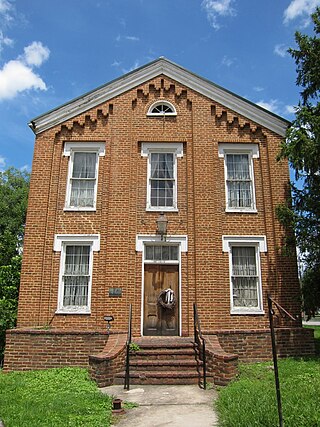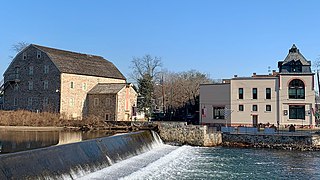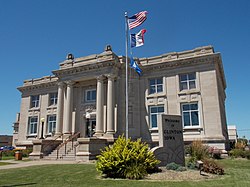
Marycrest College Historic District is located on a bluff overlooking the West End of Davenport, Iowa, United States. The district encompasses the campus of Marycrest College, which was a small, private collegiate institution. The school became Teikyo Marycrest University and finally Marycrest International University after affiliating with a Japanese educational consortium during the 1990s. The school closed in 2002 because of financial shortcomings. The campus has been listed on the Davenport Register of Historic Properties and on the National Register of Historic Places since 2004. At the time of its nomination, the historic district consisted of 13 resources, including six contributing buildings and five non-contributing buildings. Two of the buildings were already individually listed on the National Register.

Literary Hall is a mid-19th-century brick library, building and museum located in Romney, a city in the U.S. state of West Virginia. It is located at the intersection of North High Street and West Main Street. Literary Hall was constructed between 1869 and 1870 by the Romney Literary Society.

The Company F State Armory, also known as the Waltham State Armory, is a historic armory building at Curtis and Sharon Streets in Waltham, Massachusetts. Built in 1908, it is locally notable for its Georgian Revival architecture, and as the city's only armory building. It was among the last of the state's armories to be built to individualized architectural design. The building was listed on the National Register of Historic Places in 1989. The building is vacant.

The buildings at 744–750 Broadway in Albany, New York, United States, sometimes known as Broadway Row, are four brick row houses on the northwest corner of the intersection with Wilson Street. They were built over a period of 40 years in the 19th century, using a variety of architectural styles reflecting the times they were built in. At that time the neighborhood, known as the Fifth Ward, was undergoing rapid expansion due to the Erie Canal and the city's subsequent industrialization.

The Hunt Memorial Library, also known as the John M. Hunt Memorial Building, is a historic former library building at 6 Main Street in downtown Nashua, New Hampshire. Built in 1903, it is a significant early work of the renowned Gothic Revival architect Ralph Adams Cram, then in partnership with Goodhue and Ferguson. The Nashua Public Library moved to a new building in 1971. The building is owned by the city and is available for rent for functions. It was listed on the National Register of Historic Places in 1971.

The South School is a historic school building at 362 South Main Street in Torrington, Connecticut. It is a Beaux Arts architecture building, designed by Wilson Potter and completed in 1915. It was listed on the National Register of Historic Places in 1986. It is significant as a well-preserved example of the work of Potter, a New York City-based designer of schools throughout the Northeastern United States, and as a prototype for other schools built in Torrington. The building has been renovated for use as residential apartments. In 2010, a sign describes it as "South School Garden View Apartments".

The Milo Public Library is located at 121 Main Street in Milo, Maine, USA. It is located in a small, architecturally distinguished building, built with funding assistance from Andrew Carnegie. The building was added to the National Register of Historic Places in 1989.

McKinley Elementary School is located on the east side of Davenport, Iowa, United States. It was listed on the National Register of Historic Places in 2002.

Argyle Flats is a historic building located on a busy thoroughfare in Davenport, Iowa, United States. It was listed on the National Register of Historic Places in 1983.

The Drake University Campus Historic District is located in Des Moines, Iowa, United States. The historic district contains six buildings. Five of the buildings are collegiate buildings on the Drake University campus and one is a church. The period of significance is from when the university was founded in 1881 to the end of the presidency of Hill M. Bell in 1918. The historic district has been listed on the National Register of Historic Places since 1988. It is part of the Drake University and Related Properties in Des Moines, Iowa, 1881—1918 MPS.

The Eldon Public Library is a public library and historic building located in Eldon, Iowa, United States. Established in 1906, the present building, completed in 1913 with a donation from Andrew Carnegie, is listed on the National Register of Historic Places.

The Rensselaer Carnegie Library in Rensselaer, Indiana is a building from 1905. It was listed on the National Register of Historic Places in 1994. The building no longer functions as a library; since 1992 it houses the Prairie Arts Council, a local performing arts organization.

The Bemidji Carnegie Library is a former library building in Bemidji, Minnesota, United States. It was built as a Carnegie library in 1909 and housed the city's public library until 1961. It was listed on the National Register of Historic Places in 1980 for its local significance in the themes of architecture and education. It was nominated for being a well-preserved example of a Carnegie library and of public Neoclassical architecture.

The Alameda Free Library is the city library of Alameda, California. The Carnegie library was built from 1902 to 1903 and was the first designated building for the city's library, which had been housed in various other buildings since 1877. The library was added to the National Register of Historic Places on June 25, 1982. The Alameda Free Library is located across the street from the Alameda City Hall, another NHRP-listed site.

The New Hampshire State Union Armory is a historic armory building at 60 Pleasant Street in Manchester, New Hampshire. Built in 1904, this large brick building was the first armory building in the state, and is a distinct example of Romanesque architecture. The building was listed on the National Register of Historic Places in 1982.

The Maquoketa Company–Clinton Machine Company Administration Building, also known as Building #7: Clinton Engines Corporation Administration Building, is a historic building located in Maquoketa, Iowa, United States. It was listed on the National Register of Historic Places in 2006.

Indianapolis Public Library Branch No. 3, also known as East Washington Branch Library, is a historic Carnegie library located in Indianapolis, Indiana. It was built between 1909 and 1911, and is a one-story, rectangular, Tudor Revival style dark red brick building on a raised basement. It has a truncated hipped roof behind a castellated parapet, and features terra cotta details and two hooded monk sculptures by Alexander Sangernebo. It was one of five libraries constructed from the $120,000 the Carnegie Foundation gave the city of Indianapolis in 1909 to be used towards the construction of six branch libraries. The other buildings include the Indianapolis Public Branch Library No. 6 and the Hawthorne Branch Library No. 2. A full renovation of the library was carried out in 1978 at a cost of $200,000. During a 2003 renovation, the interior was recarpeted and the metal entry doors, which were put in during the 1978 renovation, were replaced with custom oak doors modeled after the original doors. Indianapolis Public Library Branch No. 3 retains a high level of architectural integrity and continues to serve the community in its original role. The library remains in operation as the East Washington Branch of the Indianapolis Public Library.

The Alvah N. Belding Memorial Library is a public library building located at 302 East Main Street in Belding, Michigan. It was listed on the National Register of Historic Places in 1993.

The Little Falls Carnegie Library is a historic Carnegie library in Little Falls, Minnesota. It was added to the National Register of Historic Places on November 3, 1980, for its architectural significance.

The Clinton Historic District is a 175-acre (71 ha) historic district encompassing much of the town of Clinton in Hunterdon County, New Jersey. It was added to the National Register of Historic Places on September 28, 1995, for its significance in architecture, commerce, engineering, industry and exploration/settlement. The district includes 270 contributing buildings, one contributing structure, and three contributing sites. Five were previously listed on the NRHP individually: Dunham's Mill, M. C. Mulligan & Sons Quarry, Music Hall, Old Grandin Library, and Red Mill.























